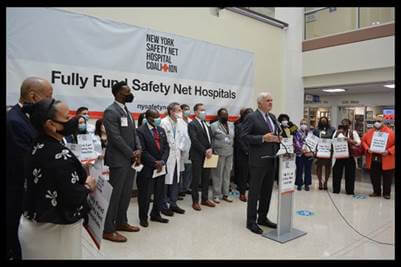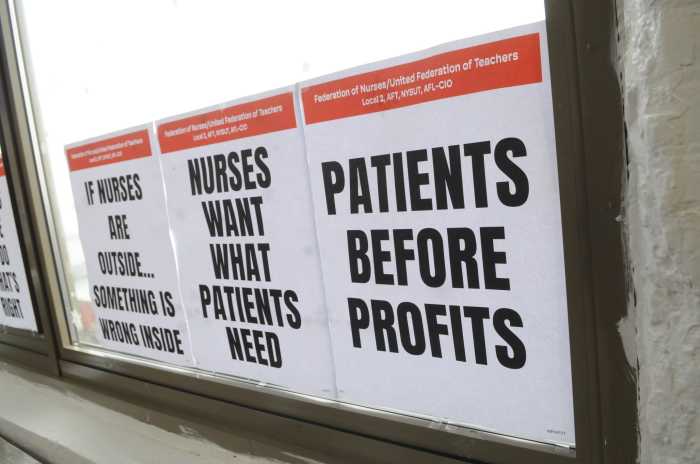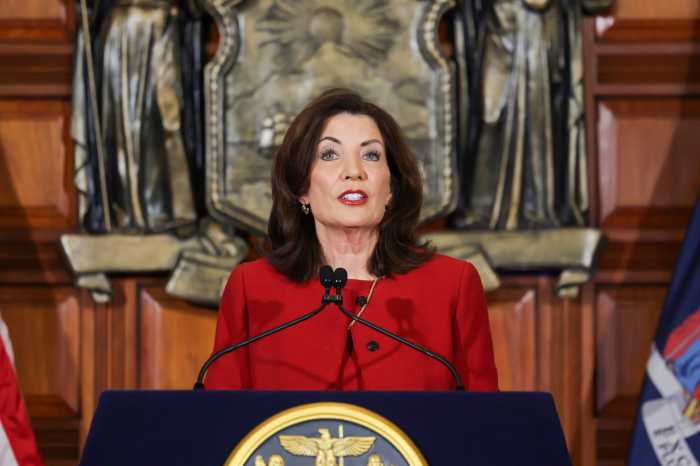The New York Safety Net Hospital Coalition, as well as hospital staff, held a press conference at the Wyckoff Heights Medical Center in Brooklyn on Friday, demanding Governor Kathy Hochul improve the Big Apple’s outdated Medicaid reimbursement system, and calling for additional funds for safety net hospitals in the FY 2024 budget.
Safety net hospitals are hospitals that serve predominantly low-income patients, many of whom are either uninsured or rely on Medicaid.
According to the Coalition, Hochul’s currently-proposed budget for FY 2024 cuts $700 million in emergency funding that had been allocated in the previous fiscal year’s budget.
In response, both the State Senate and Assembly restored the funding in their proposed one-house bills, yet the funding is still not enough to meet the financial demand and needs of safety net hospitals.
“Safety net hospitals are lifelines to millions of New Yorkers, but we are not paid adequately for providing the same care as non-safety net hospitals,” said Ramon Rodriguez, President and CEO of Wyckoff Heights Medical Center and New York Safety Net Hospital Coalition member in a statement March 20.
“The State’s outdated Medicaid reimbursement system forces safety net hospitals to operate on shoestring budgets – an unsustainable practice that undermines the communities we serve. Governor Hochul can right this wrong by enacting structural payment reform to eradicate the glaring inequities in New York’s health care system and financially stabilize safety net hospitals.”
Since New York State has yet to make any meaningful permanent increases to Medicare rates since 2008, safety net hospitals are forced to make budget cuts that detrimentally impact the very communities they aim to support.
“Safety net hospitals throughout New York City deliver lifesaving care in poor and vulnerable communities that face significant barriers to quality health services,” said Senate Health Committee Chair Gustavo Rivera. “In the absence of essential funding and structural payment reform, safety net providers face financial uncertainty and cannot invest in the resources needed to maintain, improve, and modernize their health services.”
In order to reform and improve upon the Medicaid reimbursement system, State Senator Gustavo Rivera from District 33 announced the Health Equity Stabilization and Transformation Act.
This legislation aims to maximize the use of federal funding, expand the state’s already existing Directed Payment Program for safety net hospitals and align Medicaid rates appropriately for safety net hospitals to the average regional commercial reimbursement rate.
“With the Health Equity Stabilization and Transformation Act, we are investing in the quality of care and addressing the urgent financial burden imposed on safety net hospitals,” said State Senator Iwen Chu. “Safety Net Hospitals like Maimonides Medical Center in my district are essential to New Yorkers, and it is time we pay them what’s owed so they can continue to serve New Yorkers with the greatest needs but the fewest resources.”
Other healthcare experts also recognized the necessity to improve funding for safety net hospitals and providers.
“Year after year, we commit ourselves to serving our evolving community’s needs, but due to insufficient and unpredictable funding, we are forced to make tough choices about the services and capacity that adversely impact that very community,” said Dr. David Perlstein, President and CEO of SBH Health System and New York Safety Net Hospital Coalition member. “The State can help us to solve this problem by passing the Health Equity Stabilization and Transformation Act and help us get on a solid financial footing in order to keep serving our communities.”
To learn more about New York’s two-tiered healthcare system visit www.safetynets.org and to read State Senator Rivera’s proposed bill visit the website here.

























